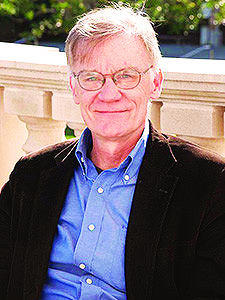
Over the summer, history professor David Blight became the sole faculty member this year to receive the distinction of Sterling Professor.
University President Peter Salovey announced Blight’s appointment in July, after alerting the professor of this honor via phone call. The appointment, widely regarded as the highest honor the University gives to its faculty members, is just one of many achievements for Blight this year. His most recent publication, “Frederick Douglass: Prophet of Freedom,” received the 2019 Pulitzer Prize in History and was named one of the best books of 2018 by The New York Times Book Review.
“It’s an honorific sort of thing, and I’m thrilled to have it,” Blight said. “It’s a great honor, and this means the rest of the time I spend here at Yale, I have a different label.”
The University president selects the Sterling Professors, subject to a vote from the Yale Corporation. Deans of schools and other faculty members can also recommend professors for the distinction. The appointments are named for John W. Sterling, class of 1864, a benefactor to Yale, and the University has named a slate of professors to the distinction over the past century.
In the past, the University has often honored several professors with the distinction in a given year. When asked why only one professor received the honor this year, Salovey said the number of Sterling professors — who can hail from the professional schools or the Faculty of Arts and Sciences — is restricted. There are 40 slots based on available revenue from an endowment fund.
“I am delighted that the university could honor Professor Blight’s numerous contributions to education and the field of history in this way,” Salovey wrote to the News. “He is renowned for his scholarship on the Civil War and its legacy and on African American history, and the Pulitzer Prize is only one of his many accomplishments.”
According to Blight, he is the only current professor in the Department of History who is also a Sterling professor. He added that the current low number of Sterling Professors in the department stands in contrast to past years, in which several professors in the department held the distinction.
Blight told the News he was unaware that he was this year’s only appointment. When Salovey called him in July to inform him of the honor, he was en route to Newport, Rhode Island, where he was to deliver a book talk on his most recent publication.
“I just feel honored by it and a little embarrassed,” Blight said. “I hope they appoint a couple more historians in my time here, because it’s going to be a bit uncomfortable to be only one.”
The Sterling designation has been one dominated by men, reflecting general gender trends within University faculty. In the past three years, three of the nine appointed Sterling professors were women. Last year, the University appointed two females — molecular, cellular and developmental biology professor Anna Marie Pyle and English professor Ruth Yeazell — to the post.
Dean of the FAS Tamar Gendler noted that in recent years, female representation with the FAS has increased. Of the current FAS faculty who received their doctoral degrees in the past five years, 49 percent are women or nonbinary. In contrast, this number over the past 45 years stands at 7 percent.
Salovey said that he is confident that the gender and ethnic diversity of Sterling Professors will increase as Yale’s senior faculty members become more diverse.
“We have made good progress in recent years, but we have much more work to do,” Salovey wrote in an email to the News. “I will continue to be focused on recruiting outstanding faculty members with diverse backgrounds and on ensuring that once they are here, they will receive the encouragement, opportunities, and recognition that they have earned.”
Last year, the University appointed four faculty members to the role of Sterling Professor. These appointees included Sterling Professor of Social and Natural Science Nicholas Christakis ’84, who resigned from his role as head of Silliman College after a race-related controversy in the 2015–2016 academic year.
Carly Wanna | carly.wanna@yale.edu







